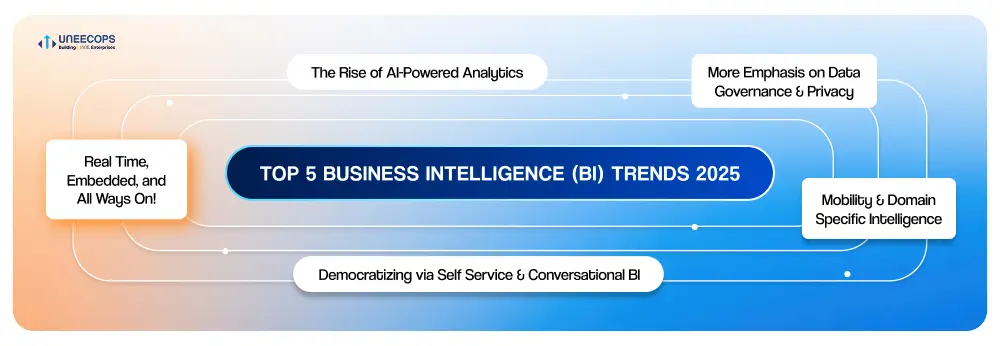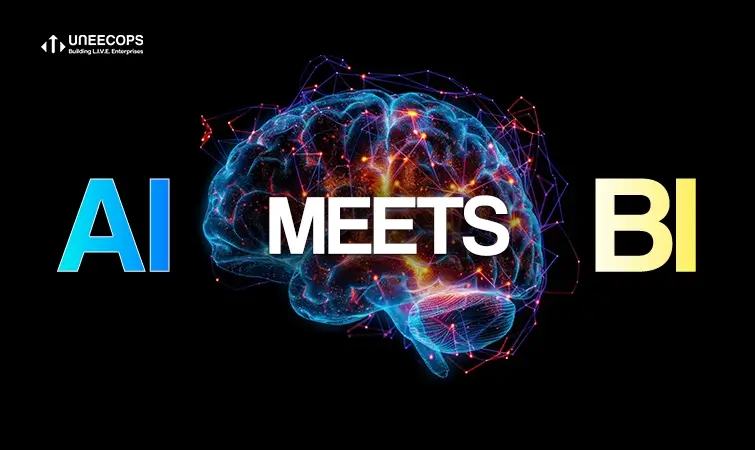As companies mature into a data-driven future, Business Intelligence (BI) is experiencing significant growth. BI has also come a long way since it was the domain of static dashboards and quarterly reports, and is maturing as an AI-powered dynamic injector of real-time understanding that machine learning enables, allowing people at all levels of an organization to make smart predictions and actionable decisions.
Here are the biggest BI trends driving 2025, and their implications for your organization.
- The Rise of AI-Powered Analytics
AI serves up a new vision for business intelligence trends. The emergent technology of AI and machine learning has dramatically changed the world of BI. By 2025, AI is braided into the fabric of your modern analytics platforms. Through automation, augmented analytics software can automatically examine data, recognize trends, and provide insights without human intervention.
There’s also a more significant application of Natural Language Processing (NLP) which is enabling individuals to use simple English when asking questions and get data-backed responses right away. AI is making BI a proactive decision support partner, whether that involves sales trends, customers who might be about to jump ship, or the detection of outliers. - Real Time, Embedded, and All Ways On!
Speed is everything. By 2025, businesses need data and analytics in real time, catching up with operations. These days, instead of just watching logistics in motion and recording retail inventory levels online, BI tools can process streaming data pipelines that inform dashboards and KPIs instantaneously.
Additionally, standalone platforms are no longer the only location of BI. That’s because of the latest business intelligence trends of analytics being baked into CRMs, ERPs, and productivity tools rather than sitting in a silo, offering employees insights that are practical for how they function with their current operations. - Democratizing via Self Service & Conversational BI
The single biggest priority for organizations in 2025 is data democratization: putting more people in touch with actionable insights. Self-service BI solutions are making querying, visualising, and sharing data easy, even for non-technical users. Conversational BI, where your chatbot and voice from interfaces are driving this even further. Now, employees can ask, “What were our best-selling products last month?” and return a visual response without requiring a data analyst.
- More Emphasis on Data Governance & Privacy
The more of BI we use, the more important data quality and data governance become. Enterprises are spending a large sum in data integrity, compliance, and access control. With privacy laws like GDPR and CCPA in place, companies also have a responsibility to care for ethical data use and privacy. Synthetic data, or artificially created data that mimics real data, is emerging as a solution, particularly in industries involving privacy/compliance-sensitive businesses.
- Mobility & Domain Specific Intelligence
Mobile BI is increasingly robust: it allows leaders to view dashboards and alerts while they’re on the move, especially in fields such as health care, construction, and logistics, where decisions are made in the field. At the same time, vertical BI solutions are on the rise among business intelligence trends. In manufacturing and healthcare, whether it be predictive maintenance or patient outcomes, bespoke BI platforms are providing deeper insights than off-the-shelf tools.

BI for Every Business: Who’s Using It and What They’re Gaining
- Banks and Financial Institutions
The finance industry includes banks, credit unions, stock brokerage, accountancy companies, insurance companies, and others. Finance professionals use BI for financial management and analysis, accurate forecasting and reporting, and data compliance
- Retail and E-commerce
Owners of the online store use BIs in many ways to improve business efforts. Some of them include data consolidation, data analysis, sales forecasting, privatization, reporting, and cooperation.
- Education Sector
Schools and colleges can improve student support, courses, and resource allocation by using BI solutions. This is beneficial in the registration process, especially for higher institutions that deal with the influx of applications per semester. Administrators will know which courses are popular options to prefer a scheduling and designing.
- Government and NGOs
Solid data with BI solutions is necessary to make a city or nationwide change. It also helps in dealing with unexpected situations. When a crisis is faced, governments are quickly equipped with countermeasures.
- Tourism and Hotels
Peak and off-peak periods can make or break hotels, entertainment, tourism, and entertainment services. Due to fluctuations in demand, they are difficult to manage. 1834 hotels used Qlik to solve their biggest challenge: gathering real-time room supply and demand data
- Fashion and retail
Trends, competition, and rapid changes are characteristic of the fashion industry. Designers face pressure to make the next “it” look of the continuous season. The BI helps them update through fashion publications for sales records, ERPs, social media, and current market trends.
- Human resources
Human resources use BIs in review and comparison of professional resumes and talent for recruitment automation. Then select top job applicants based on predetermined criteria. They also monitor the turnover trend and employee response.
- Manufacturing Industry
Manufacturers use BIs to make cost-skilled decisions. The software compiles data from many warehouses, suppliers, and partners and sells it into an accessible source.
- Media and entertainment
One of the biggest challenges in the entertainment industry is data variety and data management, a problem with a BI solution. BI and analytics solutions are capable of integrating and organizing them properly.
- Healthcare and Medical
BI use in healthcare spread in pharmaceutical services, medical research, telemedicine, patient care and training of staff. It is often difficult to integrate healthcare and business intelligence because how sensitive medical records are.
- Telecommunication
Business intelligence solutions solve many problems for telecom providers. They look out for network congestion, connectivity, and call drop rates that customers disrupt the conversations and lead to churning. The BI also studies the user call pattern and contributes to detecting fraud.
- Transportation
The BI assists airlines in increasing its revenue currents. A good case study is how Dubai airports used tableaux to attract more airlines, expand their routes and meet customers’ needs.
Before it gets late
The latest Business Intelligence trends in 2025 are nimble, smart, and available. As AI, real-time data, and easy-to-use interfaces become the expected, BI is moving from being back-office driven to a core element of modern-day business operations and planning.
If you can work with these trends, you tip the odds in your favour – one revelation at a time.








